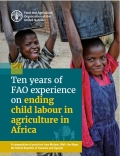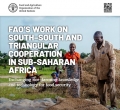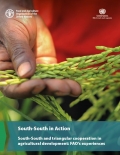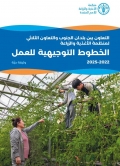وثائق

South-south Cooperation
28 Nov 2022
In the last decade, FAO has been supporting governments and agricultural stakeholders to address the root causes of child labour in agriculture in Africa. This compendium provides an overview of the projects implemented, results, promising practices and lessons learned.

South-south Cooperation
12 Sep 2022
For more than 25 years, FAO has been successfully facilitating South–South exchanges of cost-effective experiences and technical know-how, relevant to local conditions. The aim is to strengthen food security and nutrition. FAO has also supported African governments to set up their own unilateral trust funds to finance South – South Cooperation initiatives in their countries, such as Nigeria and Angola.
Civil Society
17 Aug 2022
If you would like to know what to do in order to request formal status, please contact us: [email protected]
International Non-Governmental Organizations with FAO Formal Status
Consultative Status
1. ACWW Associated Country Women of the World
2. CI Caritas Internationalis
3. ICA International Cooperative Alliance
4. ICC International Chamber of Commerce
5. ICW International Council of Women
6. IFRCRCS International Federation of Red Cross and Red Crescent Societies
7. IUF International Union of Food, Agricultural, Hotel, Restaurant, Catering, Tobacco & Allied Workers Associations (ex-IFPAAW)
8. WFTU World Federation of Trade Unions
9. WUCWO World Union of Catholic Women's Organizations
Specialized Consultative Status
1. ACF Action Contre la Faim International
2. AOAC Association of Official...
South-south Cooperation
04 Aug 2022
This publication outlines key features of South-South and Triangular Cooperation (SSTC) and how FAO has applied SSTC to the delivery of its mission. The case studies presented provide a window on how SSTC has contributed to alleviating hunger and malnutrition in countries across the global South and has helped build resilience in the face of climate change and other development challenges. The lessons learned from these experiences are feeding into the new FAO SSTC Guidelines for Action (2022–2025) and will guide FAO's future results-based SSTC programmes.
South-south Cooperation
19 Jul 2022

